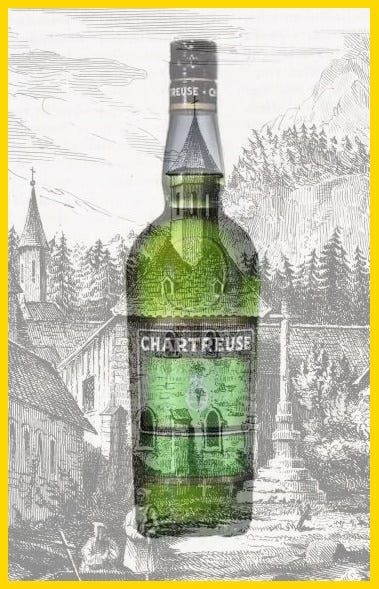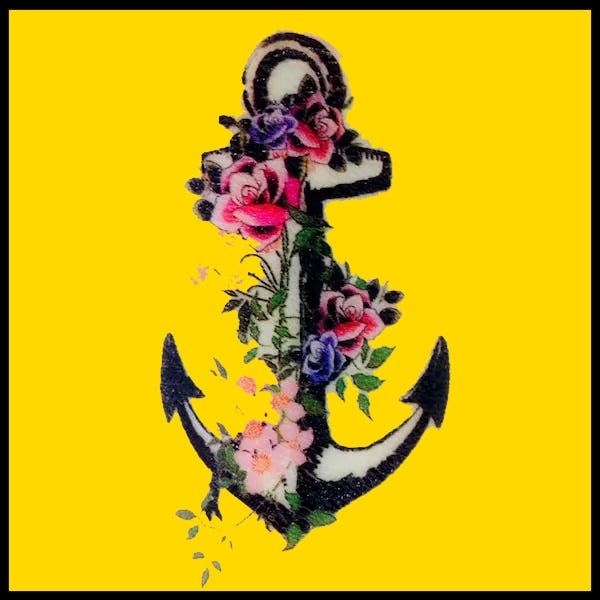The MetaModern Business Bureau (MMBB)
Transitional Economics for Liminal Networks
(an audio version of this essay is available for paid $ubscriber$)
Q: How do people possibly make a living doing this?
Good question.
I. The Material Question
A bonus chapter at the end of G. I. Gurdjieff’s (most readable) book, Meetings With Remarkable Men, is entitled “The Material Question.” This short text purports to address the topic of financing within developmental institutions. I say purports because it is a typically wild cavalcade of autobiographical anecdotes. At the least on the surface. Hieroglyphically, it might be about some other “material” — but that’s for another article. Today we’re talking about money.
The so-called material question is on everyone’s lips. Very few actionable answers are available. In parts of the transrational, regenerative, metamodern, liminal, Game B, integrative (et al) networks, we spend a lot of time discussing Bitcoin, ecological economics, gift economies & Metamodern Monetary Theory. Good.
Some of us spend time exploring how to open our solar plexus power, process our “intergenerational stuff around money,” and generally get better at the art of being in the flow of abundance. Also good.
We just do not spend a lot of time collectively examining the present and future financing options for people we think are doing essential work.
There is a moderately-sized, international meta-network of intelligent, motivated, multipotentialites (i.e. adaptive, self-aware people with multiple strong talents) who are putting a career’s worth of time, energy, heart, creativity & cognitive effort into learning, processing, and generating the cultural materials and biopsychosocial capacities that are needed for regenerative social transformation, depth philosophy, Big Picture sensemaking, participatory collective intelligence, transdisciplinary emergent sciences, building intentional communities, advancing full-spectrum well-being & unfolding integrative, transperspectival postpostmodern solutions in all areas of life.
Almost all of them are living with financial insecurity.
That means that they lack the social clout that accompanies wealth. Many are on the edge of poverty. Often they cannot afford homes, families, or social experiments to test their insights. And in countries like the United States, many of them may be bankrupted by healthcare bills, student debts, etc.
If we accept (and we don’t have to) that these people are plausibly connected to urgent questions of social transformation and personal growth for human beings then they need to be materially stabilized.
They need to be able to live, work & breed. They need to have their hearts and brains liberated from the constant distraction of material worry. They need to get to gatherings, retreats, and conferences. Afford equipment. Take the right courses. Etc.
In an ideal world, I would pay people to come to my in-person events and participate in my online courses. Practically speaking, I cannot even attend these events myself unless a sufficient amount of capital is already streaming towards me (and keep it coming) but this is not the satisfying, next-level economic system that we need. Ultimately our new thought and new culture networks have to find ways beyond the “postmodern capitalism” that is stuck charging people to access their own community, ideas, and developmental practices.
II. Prominent Existing Strategies
Here are the several ways (archetypes?) that financial flows are currently operating to support these people:
The Hobbyist is involved “on the side.” Hobbyists have some other job that pays the bills. So they squeeze their liminal activities into free moments. If the job is not cognitively demanding, maybe they can use work hours to absorb the many streams of information they need to access and integrate. But perhaps the job exhausts their physical, social, or mental energy leaving little left over to pursue leading-edge inquiries. This is even true of some of the “tenured professors” in our networks. And perhaps a great deal of time is wasted in cycles of leaving insufficient jobs and then, impoverished, crawling back to the same profession a while later…
The Content Provider writes books, provides courses, hosts retreats, authors newsletters, etc. With a few exceptions, they make barely enough to get by — and often provide much of their content for free as a “community service.” It is also a struggle not to get captured by the potentially pernicious Game A psychology of being an expert or self-marketer.
The Grant Recipient receives a small stream or larger lump sum from a developmentally-minded institution (eg. The Vervaeke Foundation, the Fetzer Institute). Only a few people, of course, have the experiential knowledge and confidence to locate and successfully apply for such grants which, also of course, run out…
The Fundraiser is a viable approach for charismatic, optimistic & well-connected people who give good deck (sic). Annual or event-specific ‘asks’ can draw on many small donations, several larger donations from semi-wealthy sources or one big donation from a superwealthy source. The latter is rare. Also many layers of “managerial protection” form to insulate and skew donors toward more conventional and shallower directions. Currently, it appears the that frame of Leadership is useful for attracting the interest of entrepreneurs, tech money, and upcoming civic leaders.
The Wealthy Friend is someone who just likes you, wants to encourage a world with more of “your style” in it. These people operate in and out of the liminal networks and periodically provide a sudden gift or funding proposal that aligns with their particular interests.
Insofar as these essential networks, and high-value metamodern multipotentialites are operating at all, it is through an unstable intersection of the models we have just explored.
What else is possible?
III. The Monastic Option
Monks periodically figured this stuff out.
They understood that if you need to scale up the “teaching” then you cannot charge for it. You must make the cultural products freely available and you also have to be able to house, feed, and provide training (for free) to individuals who have the appropriate capacity and inclination.
This makes complete sense in an emergent evolutionary model of reality. The “meaning level” of the stack rests upon more basic layers that must first stabilize and produce surplus.
Famously, some of the Medieval Christian monastic networks produced and sold beer, honey, liqueurs, etc. They made a business of products that specially:
require attention, craftsmanship and cooperative teamwork
are desired by townsfolk in both good times & bad,
generate goodwill in the community
are psychologically associated with existential transformation (i.e. spiritually branded)
can be enjoyed by the monks when it doesn’t sell.
That’s smart.
It often allowed them to practice team-building, and worldly impact, while generating funds to secure living conditions and resources for the people most interested in and willing to be engaged in “higher teachings and exercises.”
This strategy can be critiqued.
It is not hard to imagine sensitized complaints about alcoholic white males, in hierarchical dogmatic organizations, trying to “profit from spirituality” while selling poison to the masses. But critiques are easy and many variations are possible. Arguably, our communities are too full of idealists who sabotage pragmatic attempts to “generate stable excess cash to provide leading-edge culture and growth community for free” and end up simply “impoverished & treating their peer group as ideologically-polarized consumer base.”
It is hard to tell which is the bigger problem — engaging in potentially problematic successful businesses that fund transformative community or staying pure and ending up ineffective and selling yourself anyway. We’ve got to find thinking that grows beyond the current situation.
To assist that, I’m going to introduce three new terms:
Limicoin, Anchor Funding & the MMBB.
IV. “Limicoin 2025, bitches!”
That’s a silly quote for a silly name that points to a serious EVENT. The main idea is simply to start having community events that specifically focus our emergent collective intelligence on the problem of stabilizing financial dynamics.
It’s a play on the name “Limicon” (a fan-themed liminal community event in Spring 2024). The twist is that we devote some of these things to money.
Has there been an Emerge gathering about prosperity? No.
Could the next RSPND gathering (or its successor) be about the “wisdom” of financing? Yes.
We do not know all the answers. So we must begin to gather, collectively and overtly, in order to pool our sapience. We must challenge each other to think both pragmatically and imaginatively. We need to hear each other’s concerns and insights, share data about actual projects, etc. Very straightforward actually.
How do we take advantage both of classic economic realities and emerging economic disruptions?
How do we make money to serve justice and humane development without undermining money flows through endless subtle concerns about justice, group organization, messaging, self-inspection, etc?
How do we collectively get more open & more powerful about money without slipping into the insipid “postmodern spiritual economics” that turns us into capitalist shills?
Do we need our own digital currency?
Etc.
Limicoin.
V. Anchor Funding
One of the main questions to address at such an event is that of “anchor funding.”
This is a term that Turquoise Sound & I have been throwing around for a little while. It’s a way of branding the sexy concept of economically stabilizing high-value, liminal generators.
In part, it involves reprioritizing the attitudes of benefactors & patrons away from just “events” and “special projects” — toward ongoing small flows that anchor people materially and psychologically by stabilizing their basic living conditions.
Very straightforward.
VI. The MetaModern Business Bureau (MMBB)
But all of this was just a build-up to the main concept of this article. We could call it anything but I’m referring to it today as: The MetaModern Business Bureau.
It is a very simple idea:
A small body of people with the willingness & expertise to rapidly facilitate, and interlink, new small businesses in the integral, metamodern, liminal, and Game B spaces.
The MMBB is an organization of people informed by experience in start-ups, investments, and business legalities. They operate to locate and establish small liminal crews and match them to particular kinds of viable local business opportunities.
The goal of these businesses is simply to (a) make money in a way that (b) involves other people with similar values, emotional intelligence, and cognitive complexity, and (c) requires a limited amount of time on a daily or weekly basis.
This is a very targeted goal. The goal is NOT to figure out how to build the ideal business of tomorrow. It is not to figure out what life path is best. It is not to template and broadcast ideological values. All of that stuff is meant to be served by the incoming cash flows.
Crews organized into these businesses — which, although being basically benign, nonetheless prioritize money production over a host of other possible ethical and spiritual concerns — stabilize their domestic lives, increase their capacity to accomplish partial goals as teams, & maximize free time for liminal productivity.
A sizeable percentage of the surplus money generated, beyond anchor funding for the team, is earmarked to provide cultural artifacts, services, and events for free.
The MMBB also oversees the integration of these small business crews into a political bloc that can lobby various scales of government to put pressure on political agendas — an aligned network of meta-businesses.
We know the Mormons do this. We know the Scientologists do this. And we know that we are somehow capable of outperforming them without getting entrenched into their often regressive or status quo, moralistic mentalities. If we do not do something like this we risk significantly minimizing our potential impact on global systems.
Pascals’ Wager this month is that there are a significant number of people out there who, if they could get the right help, to make it easy to find each other, group together, incorporate and streamline for profitability without excess time commitments, they would drop what they are currently doing and shift into an emergent armada of existentially aligned small business crews.
Hail Lakshmi.








Fyeah. This is exciting to plug into. One of the ways I've been thinking about this for... jeez, 4 years now... is that you can consider those who are seriously orienting towards Game B, metamodern, integral, developmental, liminal ways of being, etc, and kind of draw a line around them, and say "consider this as an economy, that trades with the rest of the global economy. what are its imports? what are its exports? what does it generate and consume internally/domestically?" And as you note, a lot of its exports at the moment are content and events for other interested people, or research projects that donors pay for. In other words, it kind of depends on a nearby outer circle that is still making its money in other ways.
And that's not a problem...! But at some point, in order to actually expand this economy majorly, it has to start making more material things—opening restaurants, grocery stores, building buildings, etc. Or making things like software or new kinds of devices that can be sold at scale. And these companies could be DDOs (deliberately developmental organizations, Kegan's term) where people are learning how to live in these new emerging worlds while also waiting tables. Delancey Street Foundation in SF is a tiny case study of that as well, from a very different angle. Grocery co-ops sometimes have a bit of this element. And suppose there was a Game-B Grocery (plz dont call it that) thriving in a neighborhood: now the mere economic pressures of people getting fed, both inside and outside this virtual "economy" defined by those willing the new cultures into existence, are fueling this emergence.
I've also had an adjacent vision that involves networks or an odd holding company where people are fluidly moving between working on different projects on independent teams, depending on where their unique skillsets are most needed, and the smoothness of this collaboration is facilitated by the full-spectrum cultural tech. Here's are two articulations of that vision: adjacent possible (https://malcolmocean.com/2022/05/illustration-of-adjacent-possible-meta-team-vision/) and 10-15 years out (https://malcolmocean.com/2022/05/100x-vision/)
One thing that bodes well for our current time is that it used to be that in order to amass wealth (especially without working full-time) you had to have a ton of employees basically, which could be generative but was often exploitative. But now, and increasingly, a remarkable amount of excess wealth can be generated by an individual leveraging software they've written, to scale some shape that they want to offer into the world. I'm an example of this archetype not named in your list: I export the purposeful-improvisation to-do list app https://intend.do from the liminal economy into the wider one, and this funds my being able to work on obscure research into trust and collective perception. I'm a bit stuck on scaling it enough that I have enough wealth to breath easy and have some influence, not just enough-to-get-by. But it might be possible for this business to be 3× or 10× or 30× the size, with a bit of strategic maneuvering.
I worked for ten years at a Benedictine Monastery in the Development office. I managed the donor database, did donor research (snooping using database subscriptions that aggregated public records including non-profit donations. I also did research and provided financial data for fundraising feasibility studies for million dollar capital campaigns.
...and, drum roll.... I'm in the other category known as, "retired."
But, to your point, Layman, gathering the human resources is a daunting enough task, deciding and agreeing on a course of effective action, without the survival incentive that enclosed communities have, might require just the right style of genius. Maybe you have a plan?